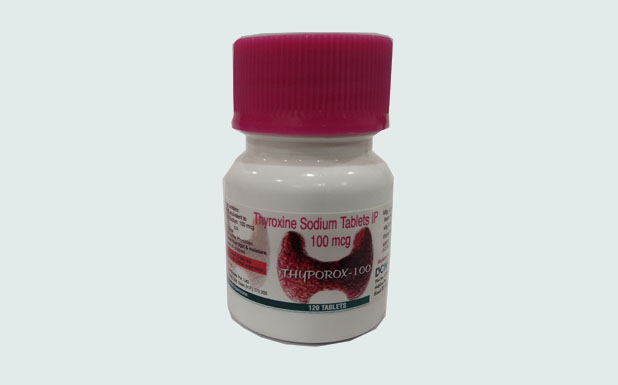
Composition
- Each uncoated tablet contains:
- Thyroxine Sodium IP equivalent to Anhydrous Thyroxine Sodium 100 mcg
Packing
- 120 Tab
Bottle
MRP
- 159.94
Overview
Thyroxine is the hormone produced by the thyroid gland. This medication is used to treat thyroid diseases such as thyroid cancer, goiter, hypothyroidism Thyroxine is mainly referred to as T4 hormone. These are produced from the thyroid follicles Thyroxine is converted into tri iodothyronine.
Indications
- Cretinism
- Adult hypothyroidism
- Myxoedema coma
- Thyroid nodule
- Goiter
- Mental depression
- Thyroid cancer
Pharmacology
1. Thyroid hormones effect the metabolism of lipid, carbohydrates, protein. they enhance lipolysis and the utilization of the sugars by tissues is also increased, faster absorption of glucose from the intestine is also increased i.e. hyperglycemia, proteins synthesis is also increased; prolonged use can cause negative nitrogen balance and muscle wasting
2. It also fastens the heart rate, contraction and increases cardiac output
3. It can cause cretinism, sluggishness
4. Muscles becomes weak
5. Peristalsis movement is increased in the GIT and may cause diarrhea too in some patients
6. In kidney – the flow of urine is increased
7. Anemia is developed in hypothyroid patients
8. In hypothyroidism, women are suffering from oligomenorrhoea
Mechanism of action
Thyroxine penetrate the cells and bind with the nuclear thyroid hormone receptor, which further binds to the thyroid response element and enhances gene transcription and produces specific messenger RNA causes specific protein synthesis.
Pharmacokinetics
It is absorbed orally but its absorption decreases with food Oral bioavailability of thyroxine is 75%
Side Effects
- Anxiety
- Diarrhea
- Vomiting
- Weight loss
- Abnormal menses
- Sweating
Contraindication
- Contraindicated in diabetes
- Contraindicated in osteoporosis